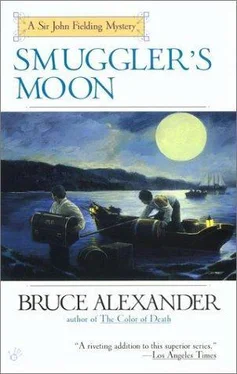Bruce Alexander - Smuggler's Moon
Здесь есть возможность читать онлайн «Bruce Alexander - Smuggler's Moon» весь текст электронной книги совершенно бесплатно (целиком полную версию без сокращений). В некоторых случаях можно слушать аудио, скачать через торрент в формате fb2 и присутствует краткое содержание. Жанр: Исторический детектив, на английском языке. Описание произведения, (предисловие) а так же отзывы посетителей доступны на портале библиотеки ЛибКат.
- Название:Smuggler's Moon
- Автор:
- Жанр:
- Год:неизвестен
- ISBN:нет данных
- Рейтинг книги:4 / 5. Голосов: 1
-
Избранное:Добавить в избранное
- Отзывы:
-
Ваша оценка:
- 80
- 1
- 2
- 3
- 4
- 5
Smuggler's Moon: краткое содержание, описание и аннотация
Предлагаем к чтению аннотацию, описание, краткое содержание или предисловие (зависит от того, что написал сам автор книги «Smuggler's Moon»). Если вы не нашли необходимую информацию о книге — напишите в комментариях, мы постараемся отыскать её.
Smuggler's Moon — читать онлайн бесплатно полную книгу (весь текст) целиком
Ниже представлен текст книги, разбитый по страницам. Система сохранения места последней прочитанной страницы, позволяет с удобством читать онлайн бесплатно книгу «Smuggler's Moon», без необходимости каждый раз заново искать на чём Вы остановились. Поставьте закладку, и сможете в любой момент перейти на страницу, на которой закончили чтение.
Интервал:
Закладка:
Sir John sighed. ”I said they’ve always accepted my recommendation in the past. That is true. This is the first time in seventeen years there has been some doubt. But if you choose to, you may still …” He left the sentence unfinished.
“Forget that! They’ll get naught from me. The deal is off. I’ll take what everyone else gets.”
Having said that, he turned and pushed his way through the little crowd that had gathered round him. Two or three turned, frowning suspiciously, and watched him go.
“Let us be out of here, Jeremy,” said Sir John, and fast as we could go with only one pair of eyes between us, we left Newgate behind.
Returning to Number 4 Bow Street, Sir John gave a perfunctory greeting to Mr. Fuller and Mr. Baker, for it was that time when day turns into night, and the Bow Street Runners report one by one to go off upon their separate assignments. It was also that time, or near it, when supper was served in the kitchen above.
We ascended the stairs and stepped into the kitchen. I believe that Sir John and I were both surprised to find Lady Fielding had returned, and even more surprised to find all three women (Lady Kate, Clarissa, and Molly) in the kitchen together-and not a word being said. I know not your experience, reader, but in mine, three women in a room together over a period of time nearly always find something to talk about. Yet into the kitchen we came, and there we did see Lady Kate in the middle of the room, her arms folded before her, a frown upon her forehead, and her lips pursed; Molly was bent over the stove, pulling from it five sizzling mutton chops; and Clarissa between them, looking unhappily from one to the other.
Lady Fielding was the first to rouse. ”Jack! You’re back!”
“Indeed I am,” said he. ”And I trust your mother is well, safely through her spell?”
“Oh yes,” said she. Then, sotto voce into his ear: ”Who is this woman?”
Then he, just as quiet: ”She is our new cook.”
”But-”
He interrupted: ”Come upstairs, and we shall discuss the matter between us.”
And so they went, he leading the way and she following. The door to their bedroom closed behind them. The three of us then breathed a simultaneous sigh of relief.
“I was afraid something like this would happen,” said Molly.
“Well, I tried to explain all to her,” said Clarissa.
“I know, I know,” said Molly. ”That was when I went off to Covent Garden to buy for dinner. I skipped right out, thinking it best if you and the lady had a bit of time together so that you might make things clear.”
“Oh, don’t worry,” said I, waving my hand dismissively (in a gesture I had copied from Sir John), ”all will be made right. You’ll see.”
“Well, what would you think,” said Molly, ”if you found a strange woman in your kitchen?”
“From what she said, it wasn’t so much that,” said Clarissa, ”as not being consulted, not having any say in the matter.”
“I can understand that,” said I.
“So can I,” said Clarissa.
“Oh dear,” said Molly.
Voices were raised behind the door to their room above. Clarissa set the table rather hurriedly, and Molly put out the food. I waited-but not for long. It seemed but a moment or two until they returned. Happily, Lady Fielding went straight to Molly and offered her hand.
“Please forgive me for my failure to welcome you,” said she. ”It was simply surprise which made me forget momentarily to tell you that we are very happy to have you in our household.” With that, she looked round and smiled modestly. ”Well then, shall we eat?”
We four took our usual places at the kitchen table, leaving Annie’s old chair to Molly Sarton, who seemed to be waiting for the rest of us to begin. Lady Fielding cut into the mutton chop and took a bite. Her face brightened immediately.
“This is really quite wonderful,” said she. ”How did you manage?”
With that, Clarissa and I exchanged relieved glances. A crisis, it seemed, had been averted-or at least delayed.
Quite early the next morning, when I was the only one up and about, Mr. Baker came up the stairs and informed me that a message had come from Newgate for Sir John. He asked me to summon him. Answering my knock, Sir John appeared in his nightshirt, and not bothering to dress further, went down directly to Mr. Baker and received the news that Edward Potter had been murdered during the night, his throat cut, his body cold and rigid when it was discovered during the early morning. All those in the big holding cell naturally proclaimed their innocence and insisted they had neither seen nor heard anything of a suspicious nature during the night. Having listened carefully to Mr. Baker, Sir John thanked him and sent him on his way. Then did he turn to me with a most woeful look upon his face.
“You know what this means, Jeremy, do you not?”
“That there will be no murder trial-is that not so?”
“Exactly so.” He sighed. ”Potter might have been put upon the witness stand and badgered into telling what he had seen in spite of his intentions to keep silent. But now, with no witness at all …”
“There would be no point in bringing Sir Simon to trial for murder.”
“My certainty of his guilt counts for nothing. Well, I shall have a letter for you to take down as soon as I am dressed.”
“A letter to whom?” I asked.
“To the Lord Chief Justice.”
”Surely not your letter of resignation?” I was for a moment truly alarmed.
“No, that would serve no good purpose. I shall simply inform him of this event and make a few comments upon it.”
Yet the letter, as dictated by him and taken down by me, was a good deal more than what he described. I should like to have had a copy of that letter so that I might present it here verbatim, for it was a good example of how Sir John’s mind worked. He began by informing Lord Mansfield of Potter’s death and assuring him that there could be no doubt that he had been murdered, since his throat had been cut. Why had he been murdered? The most likely reason, Sir John suggested, was that Sir Simon had ordered it, sent word down from his private cell that Potter, poor specimen that he was, nevertheless constituted a danger to him as a witness to the crime he most certainly had committed. If Lord Mansfield believed that because Sir Simon and the smuggler crew were in separate cells, some distance apart, such communication would be impossible, then he had no practical notion of just how corrupt was the guard force there in Newgate Gaol. A proper bribe would bring a prisoner anything he desired. Notes delivered within the prison were the least of it; a guard might well oblige with murder, if murder were required and if the sum paid were sufficient.
Of course, said Sir John in the letter to the Lord Chief Justice, there could be no question now of trying Sir Simon on the charge of murder. Without a witness to the act, all that could be held against him were Sir John’s suspicions and his theory of the crime. But (I recall these concluding lines so well that I believe I may put them within quotation marks): ”I would remind the Lord Chief Justice that in addition to the charge of homicide, Sir Simon Grenville was also bound over for trial on the lesser charge of smuggling. He will not, I hope, be forgiven this simply because his father was lucky enough to be your friend.”
Though put more eloquently than I have done here, this was what I remember of the letter to Lord Mansfield-direct, forceful, and challenging. By the time he had read to the end of it, the Lord Chief Justice may well have wished that he had instead received that letter of resignation with which Sir John had threatened him.
The letter was delivered by me into the hands of Lord Mansfield’s butler. With that, he seemed actually to be disappointed that we were not to have our usual disagreement over whether or not I was to be admitted into the great man’s presence that he might scrawl an answer in the margin of the letter.
Читать дальшеИнтервал:
Закладка:
Похожие книги на «Smuggler's Moon»
Представляем Вашему вниманию похожие книги на «Smuggler's Moon» списком для выбора. Мы отобрали схожую по названию и смыслу литературу в надежде предоставить читателям больше вариантов отыскать новые, интересные, ещё непрочитанные произведения.
Обсуждение, отзывы о книге «Smuggler's Moon» и просто собственные мнения читателей. Оставьте ваши комментарии, напишите, что Вы думаете о произведении, его смысле или главных героях. Укажите что конкретно понравилось, а что нет, и почему Вы так считаете.












